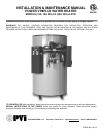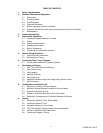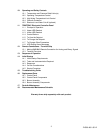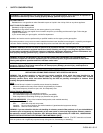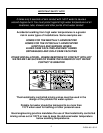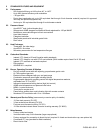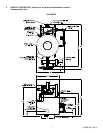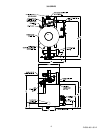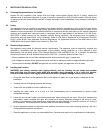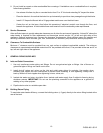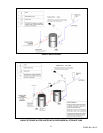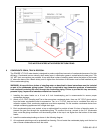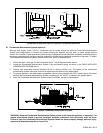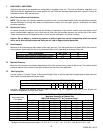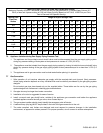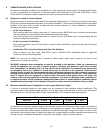9
PV500-46U 06/12
4 WATER HEATER INSTALLATION
4.1 Checking Equipment Before You Install
Inspect the unit completely upon receipt from the freight carrier before signing the bill of lading. Inspect the
appliance and all accompanying parts for signs of impact or mishandling. Verify the total number of pieces shown
on packing slips with those actually received. Contact the freight carrier immediately if any damage or shortage is
detected.
4.2 Codes
The equipment must be installed in accordance with those installation regulations in force in the local area where
the installation is to be made. Authorities having jurisdiction must be consulted before installation is made. In the
absence of such requirements, the installation shall be in accordance with the instructions in this manual, appliance
markings and supplemental instructions and in compliance with the latest edition of the National Fuel Gas Code,
ANSI Z223.1. Where required by the Canadian authority having jurisdiction, the equipment must be installed in
accordance with the latest edition of the Installation Code for Gas Burner Appliances and Equipment CAN/CSA
B149.1 and/or B149.2 and applicable Provincial Regulations. All appliances conform to the latest edition of the
ASME Boiler and Pressure Vessel Code, Section IV, Part HLW.
4.3 Electrical Requirements
See appliance rating decal for electrical service requirements. The appliance must be electrically supplied and
grounded in accordance with the requirements of the authority having jurisdiction or in the absence of such
requirements, with the latest edition of the National Electrical Code ANSI/NFPA No. 70. In Canada, the electrical
service must conform to local electrical codes and/or CSA C22.1, Canadian Electrical Code, Part 1.
All wiring between the unit and field installed devices must be made with type T copper wire.
Line voltage wire exterior to the appliance must be enclosed in approved conduit or approved metal clad cable.
To avoid serious damage, DO NOT energize the unit until the system and appliance is full of water.
4.4 Handling and Location
WARNING: Use industry standard safe rigging methods, such as including the use straps and spreader
bars and lifting from the water heater base skid assembly, when attempting to lift or move this product.
Failure to follow industry safe rigging methods could result in property damage, serious injury or death.
1 Check the data decal on the appliance. Be sure the electrical, water, oil, or gas supply is adequate for the
installation.
2 Carefully remove all shipping supports and bracing.
3 These units are suitable for indoor installation only.
4. Installing the water heater on a 4 inch to 6 inch housekeeping pad is recommended to ensure proper
condensate drainage.
5. Locate the unit so that if water connections should leak, water damage will not occur. When such locations are
unavoidable, install a suitable drain pan, and plumb pan to ensure adequate drainage in the event of a leak.
Under no circumstances is the manufacturer responsible for water damage in connection with this unit, or any of
its components. The manufacturer’s warranty does not cover water damage.
6. Protect associated electrical components and electrical connections from water (dripping, spraying, rain, etc.)
during appliance operation and service.
7. Place the appliance on a level, non-combustible floor. Concrete over wood is not considered non-combustible.



